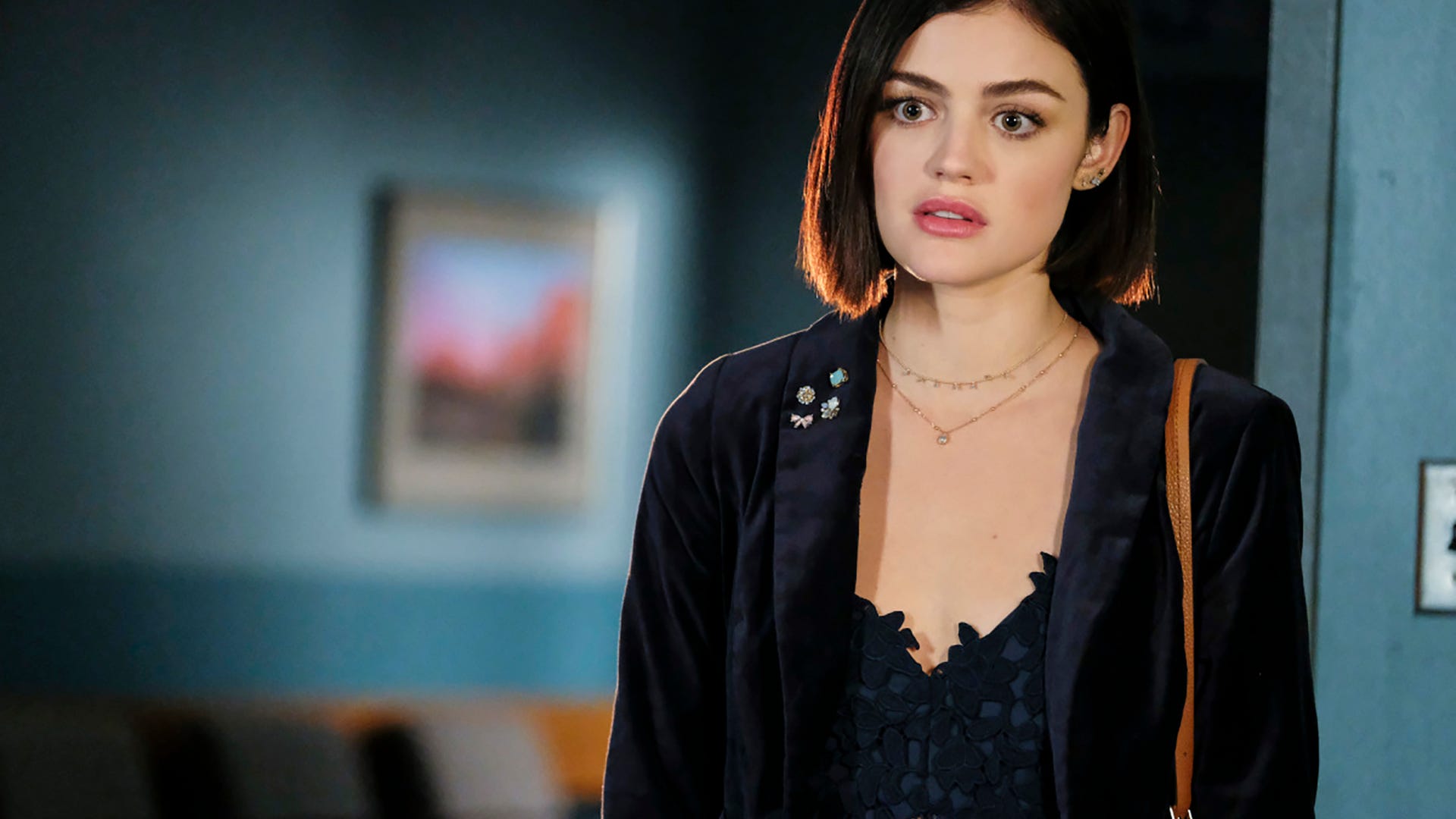Join or Sign In
Sign in to customize your TV listings
By joining TV Guide, you agree to our Terms of Use and acknowledge the data practices in our Privacy Policy.
Not Every Show Needs a Love Triangle
CW's Life Sentence is following a time honored tradition - but does it need to?
There's a time-honored tradition in Hollywood that television shows, especially shows aimed at young female audiences, need to have a love triangle to be successful. This is not true. Not every show needs a love triangle, and not every show should have a love triangle.
Take, for instance, The CW's new dramedy Life Sentence. The series follows Lucy Hale's Stella, a young woman in her early 20s recently completely cured of cancer. Ignoring the fact that this is not exactly how cancer works, being cured has given Stella a new lease on life. After all, she's still young! She's newly healthy! This means she can finally explore her new marriage to Wes (Elliot Knight), a man she married even though she barely knew him simply because she liked him and thought she was going to die. Being cured also means she can get her first job -- okay, she's just a barista, and not even a very good one -- but the point is, Stella is branching out and doing all the things you'd expect a young woman in her position to do.
Life Sentence's Lucy Hale Previews the Struggle of "Live Like You're Going to Live"
The catch, of course, is that as Stella's life finally starts to come together and her future begins to take shape, her family begins to fall apart without the pressure of her illness forcing everyone to put on brave faces. Her mother (Gillian Vigman) leaves her father (Dylan Walsh) for another woman. Her sister (Brooke Lyons) admits she put her dreams on hold and had children to give her parents a bit of joy. Her brother (Jayson Blair), well, he's always been candid about his shortcomings but remains unwilling to do anything to change them. And her husband admits he doesn't like to always have to have sex to Sara Bareilles (among other things). This set up alone provides enough narrative material to carry the show through its first season, but Life Sentence, in just its third episode, is already setting Stella up to possibly question her relationship with Wes by introducing a potential new love interest.
Now, this other man -- his name is Will (Riley Smith) -- has more in common with Stella than her husband does. Will is an oncologist whose brother died of cancer, which means they bond over a shared history of trauma and pain that Wes cannot truly understand. Will is so taken by Stella and her drive and desire to help current cancer patients that he tells her, in the very same episode in which his character is introduced, he wished he'd met her before she was married to Wes. She's caught off guard but not entirely unaffected by Will's comments, and we're left to wonder what this means for Stella's future.

Riley Smith and Lucy Hale, Life Sentence
Michael Courtney/The CW
All of this is perfectly natural. It makes sense for Stella to potentially question her decision to marry a man she barely knew, especially as she begins to get to know the real Wes and not the man he pretended to be when he thought she was going to die. Honestly, it'd be odd if Stella didn't look back at her choices and wonder if she'd have still made them if she hadn't been sick. But to throw another potential love interest into the mix to hasten this story feels forced and rushed, especially since Life Sentence just spent the entire episode prior to Will's introduction focusing on how much Stella loved Wes as he faced possible deportation for marriage fraud.
Life Sentence, and many shows like it, always seem to fall victim to the idea that a love triangle is a prerequisite for success, but in this case, it threatens to complicate matters unnecessarily. Life Sentence isn't a terribly deep show, it's not even all that interesting on its best days, but its heroine deserves to be more than just her over-complicated love life. Stella deserves to have storylines that don't involve being caught between a man she loves and a man who understands her. Generally speaking, women deserve to have more and be more and do more than fill the same tired boxes they've always filled. Even if they're the leads of a typically sexy CW show.
Where We Left Off: Get scoop on your favorite returning spring shows
Now, this isn't to say love triangles aren't worthwhile, can't drive story or even produce deeply moving heartfelt emotion that's still felt years after the fact -- if you want someone to wax poetic on the endearing love triangles of The WB, I certainly have the time and ability to do so -- but not every series needs to go down this particular path. At this point, Stella and viewers alike are still learning who Stella is when she's no longer defined by her cancer. Furthermore, there's also plenty of story to be mined from Stella's relationship with Wes without making him potentially have to fight for her attention. They're finally getting to know each other, they're finally no longer stepping on eggshells around one another. Give them the chance to explore whether or not their marriage is sustainable on its own without immediately throwing another contender into the ring. What does Stella find irresistible about Wes? What makes Wes tick? How do their dreams match up? What issues might arise from Wes' place as the newest member of the family?

Elliot Knight and Lucy Hale, Life Sentence
Annette Brown/The CW
In the same episode that Will is introduced, Wes is saddled with babysitting his sick niece and nephew, a storyline that eventually reveals more about Stella's mother than it does about Wes, but it's an example of how his character can be explored beyond being one leg of a love triangle. Because though love triangles may initially get everyone involved hot and bothered, at some point they wear out their welcome and shows are forced to scramble to find news ways to drive plot and introduce narrative tension. At some point viewers grow tired of the accompanying will-they, won't-they and just plain don't care anymore. Even the best love triangles have a finite lifespan, so why introduce them prematurely or when they're not necessary to the success of the overall narrative? Specifically, why force Stella and Wes into the same predictable situation instead of allowing them to chart a new path with their relationship?
Because if you think love triangles in young adult-oriented programming aren't all following the same formula, I ask you to take a look at popular and beloved WB and CW programs (the pinnacle of young adult/teen programming over the last two decades) like Dawson's Creek, Buffy the Vampire Slayer, Gilmore Girls, Veronica Mars, Hart of Dixie, and The Vampire Diaries and tell me that isn't true. At the center of each of those love triangles -- storylines that often drove the ongoing narrative of their respective series -- is a woman who loves one seemingly perfect man only to find herself drawn to an imperfect man who surprises her by seeing her for who she is inside. Dawson, Joey, Pacey. Angel, Buffy, Spike. Dean, Rory, Jess. Duncan, Veronica, Logan. George, Zoe, Wade. Stefan, Elena, Damon.
UnREAL Boss Breaks Down the Show's "Complicated" Portrayal of Feminism
Honestly, the list could go on and on, and we could dive into the subtle differences in love triangle makeup, but the truth is, all love triangles are essentially the same. And they will all end the same way, with one person heartbroken and going home alone. Isn't it sometimes more interesting to explore the ins and outs of a stable relationship and why it works -- Coach and Tami Taylor on Friday Night Lights are a perfect example of this in action -- than it is to throw the same conflict against the wall and hope it sticks?

Lucy Hale, Life Sentence
Bettina Strauss/The CW
Love triangles are one of the most basic and overused tropes in fiction, and it's because everyone thinks they're easy. Yes, they can sometimes reveal hidden depths that leave lasting impressions on viewers and turn characters into iconic pop culture figures (never forget Pacey Witter and the infinite joy of Pacey-Con), but love triangles can just as easily force once promising characters into making questionable choices in order to build up the competition. Gilmore Girls essentially rewrote the character of Dean (Jared Padalecki) in its second season in order to make Jess (Milo Ventimiglia) seem more desirable by default. On Felicity, nice guy Noel (Scott Foley) sometimes became insufferable when he acted as if he was somehow entitled to Felicity (Keri Russell) because he didn't treat her the way Ben (Scott Speedman) did. It's true that these love triangles often led to passionate relationships -- both between the characters involved and the shows and the viewers who followed them week to week -- but to think that every show needs to follow a similar narrative structure to be successful is incorrect. And in the case of Life Sentence, a show that's just starting out, it's a little insulting to both Stella and Wes to force them into this situation, regardless of whether they stay together in the end. Even if that relationship falls apart, it would add significant weight to their individual character arcs if they come to that realization because they've discussed the actual problems in their marriage instead of creating one (Will) as an excuse to bail.
Perhaps the most obvious argument against the unnecessary love triangle, though, is the message it sends to young and impressionable viewers. It should go without saying that real life is rarely reflected in the relationships portrayed in the shows targeted at younger audiences, and while that is certainly part of their appeal, it's not necessarily healthy if this is all young women see. There's also something to be said about the ways in which some of the male characters involved treat women -- because although television is making slow (very slow) progress in terms of representation, most love triangles are still often portrayed as two men and a woman -- and that's something to think about moving forward as well. But isn't it also just time we explore something new? Isn't it time young women get to see themselves as more than just an object to be attained by someone else? Isn't it time we allow them the chance to stand on their own and lead a show about more than just romantic melodrama?
Life Sentence airs Wednesdays at 9/8c on The CW.
